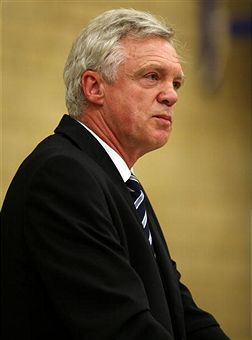 David Davis and Jack Straw have joined forces to resist the enforcement of prisoner voting rights, an emotive issue bequeathed to
the hapless coalition by the previous government. Beside the obvious moral question concerning prisoners’ rights, Davis hopes to open a second front in the struggle over sovereignty with the
European Union. He told Politics Home:
David Davis and Jack Straw have joined forces to resist the enforcement of prisoner voting rights, an emotive issue bequeathed to
the hapless coalition by the previous government. Beside the obvious moral question concerning prisoners’ rights, Davis hopes to open a second front in the struggle over sovereignty with the
European Union. He told Politics Home:
‘There are two main issues here. First is whether or not it is moral or even decent to give the vote to rapists, violent offenders or sex offenders. The second is whether it is proper for the European court to overrule a Parliament.’
Unless Davis has confused his articles, his second point is invalid. This decision has nothing to do with the European Court or the European Union. The judgement (with which I and others disagreed in principle) was made by the European Court of Human Rights in 2005. The ECHR was founded in various stages by the Council of Europe, the brainchild of Winston Churchill and an organisation to which Britain was a founder member. In 1953, the Convention on Human Rights was signed in full by all founder members. Questions about the extent of suffrage in Britain (to exclude peers and the Royals for example) were considered by the Attorney General in Whitehall, but not by the draftsman of the Convention, Sir David Maxwell-Fyfe. So, it clearly predates the 1957 Treaty of Rome and it remains entirely separate from the European Union; indeed, the Court has frequently found against EU law when implemented by member states.
There is a clear case to limit the judgements made by the ECHR: the Court had made just 837 judgements before it became a full time establishment in 1998; it has since made more than 5,000. Also, its strident conduct has enraged senior judges such as Lord Hoffman, not to mention barristers. And its practices and structure verge on the absurd. There is also a need for much greater scrutiny of the European Union – its institutions, expenditure and machinations. But Euroscpeticism and concern over the ECHR are devalued by the loose talk or transparent disingenuousness shown by former Europe minister David Davis; so too the resistance to prisoner voting rights.
On the latter point, Britain has some leeway. The Court did not deliver an absolute judgement: it did not decree that all prisoners must vote. Rather, it identified a grey area in ill-defined English law in respect of human rights, and insisted that the British government clarify the situation. Our uncodified constiution says little about prisoners’ voting rights; so essentially the Court has asked: Who may vote and who may not, according to British law. Besides, the Court has not challenged those 25 members of the Council of Europe whose legal systems either restrict or deny prisoners the right to vote. For the moment, France’s restrictions on serious criminals, Ireland’s blanket ban and even Belgium’s continued ban on voting after release, all remain in place. Therefore this is not, predominantly, a European sovereignty issue.
The government may yet find an equable solution – awarding some rights to petty criminals, whilst denying rights to those convicted of more severe crimes. But, obviously, the government is an invidious position and the mood in Number 10 will have blackened at hearing of this unlikely alliance.
UPDATE: Speaking to the Backbench Business Committee, Straw has expanded on Davis’ argument that this is a constitutional question concerning checks and balances and the sovereingty of parliament. They seek parliamentary time to debate the issue. Their point is important and certainly deserves debate; but to describe the ECHR as ‘the European Court’ is simply inaccurate.
UPDATE2: Davis and Straw have succeeded and the debate will take place later in the year. Number 10 has also added that it welcomes the debate and says that its position is ‘not far from Straw and Davis’.






Comments